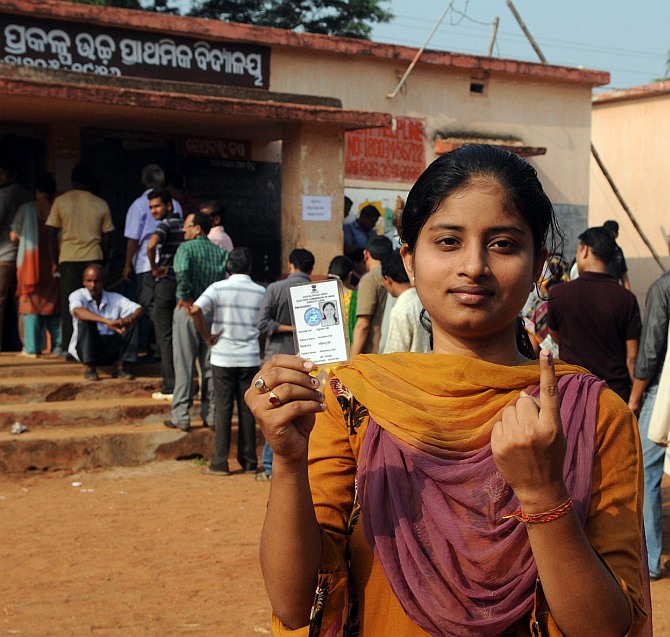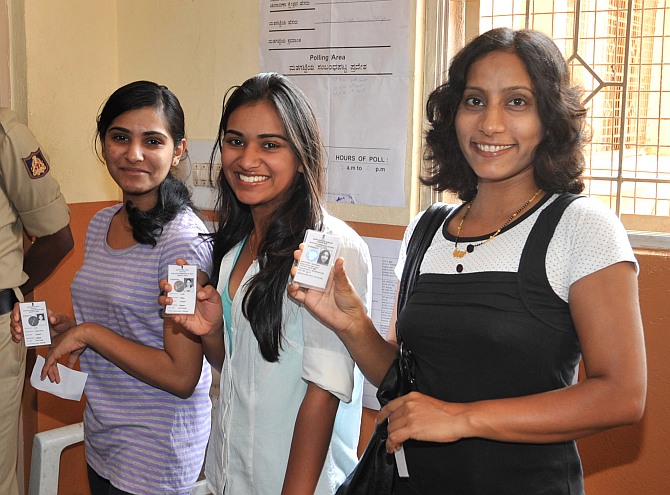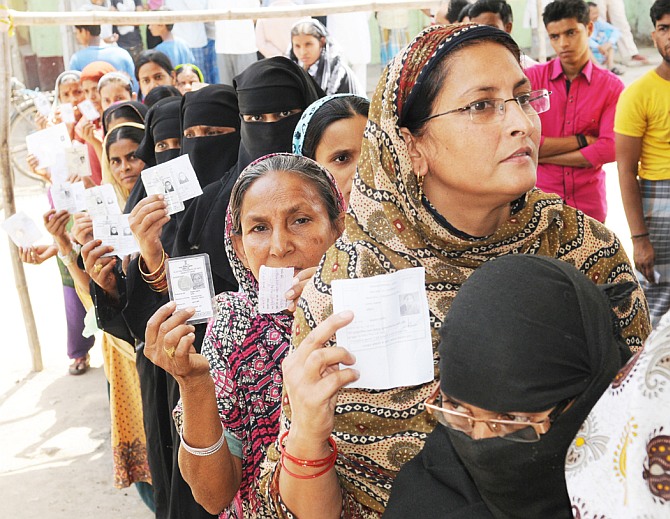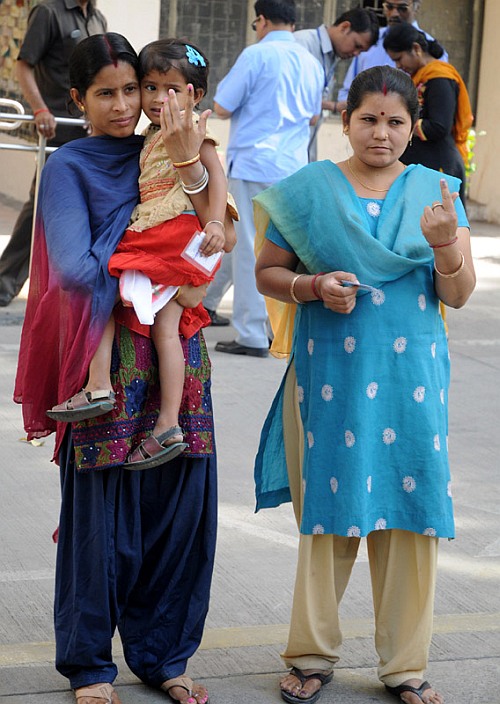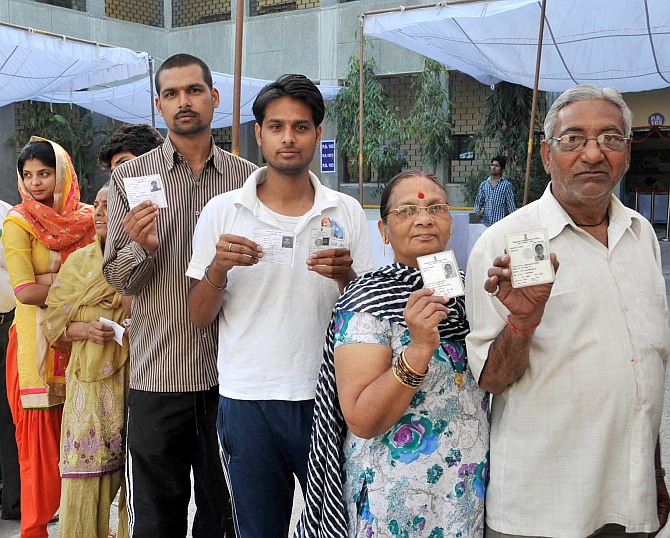 | « Back to article | Print this article |
Why voting is the new cool these days
Modi vs Kejriwal duel has triggered a spike in voter turnout, says Aparna Kalra
At 10 in the morning on Thursday, 20-year-old newbie voter Sanjay Khandelwal was the 110th person to get his finger inked in a polling booth in Bangalore Central, where Infosys’ former chief financial officer V Balakrishnan is a candidate.
Bangalore has been home for Khandelwal all his life. He speaks fluent Kannada and is concerned about the roads and the garbage regularly thrown in front of a neighbourhood school. But the scales tilted in favour of Balakrishnan for what the engineering student terms a naïve reason.
“I think he will not play around with public money as he has a lot of money of his own. Plus, I don’t believe in going by the wave assumed across the country,” said Khandelwal, who is training in mechanical engineering. He is referring to the Modi wave; based on opinion polls Narendra Modi of the Bharatiya Janata Party is predicted as front-runner to be prime minister in this Lok Sabha election.
Before polling, Khandelwal spent hours discussing politics “in college, at home, at my club (Toastmasters). It is like a face-off everywhere.” Toastmasters club, founded in the US, teaches public speaking skills and has chapters in many countries.
Click on NEXT to read further...
Why voting is the new cool these days
The young debater also spent time convincing his parents, who were part of “the wave”, to come around to his choice. There is “a political divide at home itself”, he reports.
As India entered one of the heaviest phases of polling on Thursday, what has marked this election is its high turnout. Experts, and those working in citizen forums that bring voters and candidates together, say high voter engagement is spurred by frustration with governance and galvanised by support for either Modi or Arvind Kejriwal.
“It is like going to the Kumbh Mela of democracy. It is an act of faith. Voting is no longer about duty. You are now voting to exercise choice and preference,” said sociologist Shiv Visvanathan. “The entire poetry is different”.
“Narendra Modi has stirred up the pot and this has resulted in the aroma of a larger voter turnout,” said well-known theatre personality Gerson da Cunha, who heads citizen forum Agni in Mumbai. “You cannot open the newspaper, the TV or radio without being hit by Modi.”
Da Cunha feels voters may be voting both for and against Modi, who is seen widely as a polarising figure.
Click on NEXT to read further...
Why voting is the new cool these days
The 2014 Lok Sabha elections, thanks to citizen forums, watchdogs and social media, are no longer a process where politicians are allowed to preach from the pulpit.
Instead, concerned citizens are asking questions, listening to debates, reading reports and weighing candidates. All this noise has translated into votes.
A town hall meeting in Mumbai's suburban Bandra organised by Agni (Action for Good Governance and Networking in India) on April 6, a Sunday, got more people than the auditorium could handle.
Mumbai North-Central candidates Priya Dutt, Poonam Mahajan, Phiroze Palkiwala, Farhan Azmi and Sanju Verma faced off in a public debate at that meeting.
“The negative (factor in turnout) is the increased frustration. The positive factor is that they think voting can make a difference,” says Yogesh Upadhyaya, an IIT and IIM alumnus based in Mumbai who tried, unsuccessfully, to be part of the audience at the debate in Bandra.
Click on NEXT to read further ...
Why voting is the new cool these days
The higher citizen engagement is what the Aam Admi Party or AAP channelised when it started out. Its start and the declaration of Modi as the prime ministerial candidate is what voters remember as stand-out factors in the countdown.
Days before the start of polls, Upadhyaya participated in a Google Hangout sessions where he advised voters to ask political leaders how they plan to fulfill their promises.
“Ask smarter questions”, urges Upadhyaya, who has set-up askhowindia.org, a campaign to get political representatives to answer the ‘how’ of electoral promises. “If they say we will make women safe, ask how.”
Agni in Mumbai and Bangalore’s Political Action Committee, headed by Kiran Mazumdar Shaw, help bring political representatives closer to people.
ADR or the Association for Democratic Reforms is quietly churning out data that analyses candidates.
Some forums have tied up to form election watch groups. In Bangalore, smartvote.in began a voter registration drive in 2009.
It picked up steam in the 2011 municipal elections, and for 2014 got brands on board to give discounts to voters on polling day.
The group says 30-40 per cent of new voters have not been able to register online or manually. Smartvote said it did not get a response from the Election Commission when it asked about the stuck applications.
India’s total electorate, according to electoral rolls on January 1, 2014, grew to 814.5 million from 713 million in 2009.
The Election Commission said it has employed software to clean up voting lists to rid them of duplication or dead voters. This could have helped in reducing the voter pool and pushing up the percentage of genuine voters.
Click on NEXT to read further...
Why voting is the new cool these days
For voters, the extra bang for the buck is also coming from newbies. The Lok Sabha polls this time around have drawn rank outsiders -- professionals, activists, journalists, ex-armymen -- into its fold as candidates.
While many are terming the Lok Sabha elections everything from a young election to one where women voters will hold a special place because their safety is being touted by political parties as important, each section is coming out to cast their vote.
“It’s a new generation looking for what’s new. It is an old generation also looking for what’s new”, says sociologist Vishwanathan.
Delhi University undergraduate Swati Bhatt, 20, who voted in her first Lok Sabha elections, says she was impressed with Ghaziabad candidate V K Singh’s background as the former army chief. She held discussions with friends and family, a joint family of seven, before voting for Singh, but says peer pressure is not bringing people out to vote.
“The Facebook photos are to show our rights, show our pleasure. If we don’t participate, who will?” she asked.
